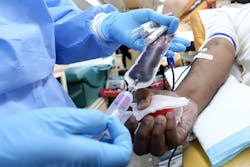FDA revises recommendations for CJD transmission and its variant by blood components
The U.S. Food and Drug Administration (FDA) issued a guidance document to provide blood establishments that collect blood and blood components with revised recommendations intended to reduce the possible risk of transmission of Creutzfeldt-Jakob disease (CJD) and variant Creutzfeldt-Jakob disease (vCJD) by blood and blood components.
The FDA said its recommendations apply to the collection of whole blood and blood components intended for transfusion or for use in manufacturing, including source plasma.
The agency said it is removing or revising prior recommendations to screen blood donors for:
· geographic risk of possible exposure to bovine spongiform encephalopathy, including time spent on United States (U.S.) military bases in Europe
· receipt of a blood transfusion in certain vCJD risk countries
· risk factors for iatrogenic CJD (i.e., a history of taking cadaveric pituitary human growth hormone (hGH)
· having blood relatives with CJD
· a history of injecting bovine insulin.

